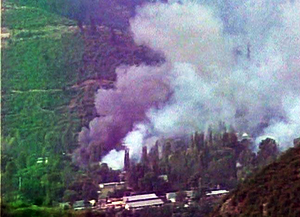Srinagar, Sep 18: Heavily armed militants stormed a battalion headquarters of the Army in North Kashmir's Uri town in the wee hours today, killing 17 jawans and injuring 19 other personnel in the terror strike in which four ultras were neutralised.
Explosions and gunfire erupted as the militants attacked the camp, which is located barely few metres away from the Army's Brigade Headquarters in Uri town, 102 kms from here, around 4 AM, official sources said.
The jawans of the Dogra Regiment were sleeping in a tent which caught fire due the explosion. The fire also engulfed the nearby barracks, the sources said.
17 jawans were killed in the terror attack, the Northern Command of the Army said. Nineteen other personnel were injured in the strike in which four militants were killed.
"A group of heavily armed terrorists targeted the rear administrative base of a unit at Uri, Kashmir. In the counter action, four terrorists have been eliminated and combing operations are in progress," the Army said in a statement.
"The administrative base had large strength of troops of units turning over after their tour of duty who were stationed in tents/temporary shelters which caught fire, and resulted in heavy casualties. We salute the sacrifice of 17 soldiers who were martyred in the operation," the statement said.
Helicopters from the Army's 19 divisional headquarters in Baramulla have been pressed into service and the injured Army personnel have been evacuated from the encounter site, the sources said.
Defence Minister Manohar Parrikar and Army Chief Gen Dalbir Singh Suhag are rushing to Kashmir in the wake of terror attack in Uri. The Home Minister has also called an emergency meeting to review the situation arising out of the terror attack.
The attack comes two years after militants had carried out a similar type of attack at Mohra in the same area. Ten security personnel were killed in the attack that took place on December 5, 2014.
It is believed that the attack was the handiwork of a freshly infiltrated group of militants who could have entered along the Salamabad Nallah into the town.
The Home Minister has postponed his scheduled visit to Russia and the United States in the wake of the attack in Uri and the unrest in Jammu and Kashmir. Singh also spoke to the Jammu and Kashmir Governor and Chief Minister Mehbooba Mufti on the situation arising out of the terror strike in Uri.
The Home Minister was scheduled to leave for Russia tonight for a four-day bilateral visit and later to the US on September 26 for a six-day tour to attend the Indo-US Homeland Security Dialogue.
"Keeping the situation of Jammu and Kashmir in mind and in the wake of terror attack in Uri, I have postponed my visits to Russia and the US," he said in a statement here.
The Home Minister said he has spoken to Governor N N Vohra and the Chief Minister and discussed with them the situation arising out of attack on a Army Brigade Headquarters in Uri and both of them apprised him of the overall situation in Jammu and Kashmir.
"I have given instructions to Home Secretary (Rajiv Mehrishi) and other officers in the Home Ministry to closely monitor the situation in Jammu and Kashmir," he said.
The Home Minister also called an emergency meeting to review the situation arising out of the attack on the Brigade Headquarters in Uri. National Security Advisor Ajit Doval, the Union Home Secretary, top Army, paramilitary and Home Ministry officials are attending it.






Comments
When BJP holds power at the centre, terrorists become fearless. They easily enter our parliament, most secured Pathankhot Air base and now Uri army base.
BJP rule is prone to terror attacks. even Sadhvi, Aseemananda gets bail.
Add new comment